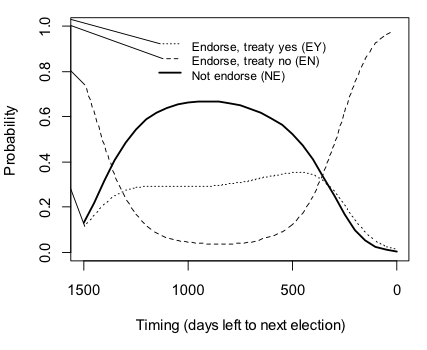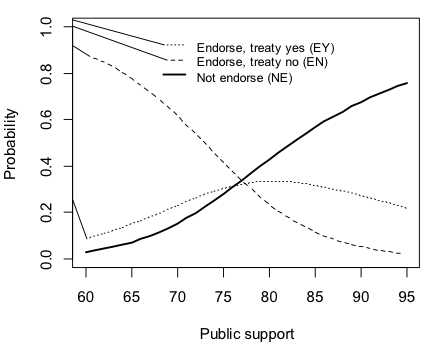
 David Cameron is committed to holding a referendum on the UK’s EU membership should he win a majority at the next general election. In an effort to understand why parties call for referendums on European integration, Andreas Dür and Nikitas Konstantinidis look at data from the ratification of the EU’s Constitutional Treaty in 2004. They find that the amount of time until the next election has a significant impact on whether parties choose to support referendums or not, and that parties are far more likely to advocate a referendum on unpopular and controversial issues.
David Cameron is committed to holding a referendum on the UK’s EU membership should he win a majority at the next general election. In an effort to understand why parties call for referendums on European integration, Andreas Dür and Nikitas Konstantinidis look at data from the ratification of the EU’s Constitutional Treaty in 2004. They find that the amount of time until the next election has a significant impact on whether parties choose to support referendums or not, and that parties are far more likely to advocate a referendum on unpopular and controversial issues.
The UK House of Commons recently passed a bill calling for a referendum on the UK’s membership of the EU by 2017. The referendum bill, which has government backing, foresees a referendum to be held after the next general election subject to the renegotiation of Britain’s relationship with the EU. This type of pledge of course, will only be credible as long as the Conservative Party wins the elections. The Labour Party, on the other hand, has made no such commitment.

This debate begs the question of what could explain political parties’ stance towards a referendum on European integration? Further, when it comes to the adoption of external treaty obligations with wide-ranging ramifications for a country’s constitutional make-up, which mechanism of ratification will parties opt for?
These are the questions that we addressed in a recent article published in Political Science Research & Methods. The strategic underpinnings of this dual choice of ratification instrument and policy position are based on a game of partisan competition within the context of a ‘second-order’ electoral contest. For the empirical analysis, we use data from the ratification of the EU’s Constitutional Treaty, which was signed by member states in October 2004, but ultimately failed to come into effect. At the time, parties in all 25 countries needed to decide whether they should endorse a referendum as a mechanism of ratification and, if yes, which position to take with respect to the Treaty. Out of the 175 parties that we considered in our analysis, 100 endorsed a referendum. Out of these 100, 46 opposed the Treaty and 54 supported it.
Analysing these data, we arrive at three major findings: first, the greater the public approval of the incumbent government, the more likely it is that parties in that country will come out in favour of a referendum and support the Treaty. Clearly, opposition parties will not want to position themselves against a popular incumbent in a plebiscite.
Second, the timing of the ratification decision matters. If the decision has to be taken towards the middle of the electoral cycle, then parties are less likely to endorse a referendum. By contrast, the likelihood of a party coming out in favour of a referendum, but against the Treaty, is highest at the beginning and towards the end of the electoral cycle. This relationship is captured in Chart 1.
Chart 1: The choice of ratification by referendum and the electoral cycle

Note: The Chart shows the probability from 0 (low probability) to 1.0 (high probability) of parties advocating referendums on European integration during periods of the electoral cycle.
This finding is driven by two independent effects: on the one hand, voters are most likely to use a ‘second-order’ referendum vote as a way to signal their discontent with the government’s performance towards the middle of the electoral cycle. In this way, they already have enough information about the effectiveness of the incumbent’s policies, while there still remains time for corrective action.
On the other hand, from the perspective of political parties, the salience of a referendum outcome also varies over the course of the electoral cycle. The closer it is to the next election, the more important positive or negative reputational effects resulting from the referendum will be. The combination of these two effects explains the non-monotonic relationship between timing and referendum endorsement.
Third, the greater the public support for a supranational treaty, the lower the probability that parties will call for a referendum. In other words, parties will tend to submit salient, controversial and divisive decisions on a country’s position within a supranational organisation to a popular vote. Conversely, they are more prone to opt for parliamentary ratification so as not to jeopardise the fate of a popular treaty reform. This relationship is shown in Chart 2.
Chart 2: Referendum endorsement and public support for the Treaty

Note: The Chart shows the probability from 0 (low probability) to 1.0 (high probability) of parties advocating referendums on European integration depending on the extent to which the public supports ratification of a treaty (shown on the horizontal axis, where a higher figure indicates greater public support).
What are the broader implications of these findings? First, our findings suggest that incumbents generally loathe using referendums on international treaties as popular plebiscites. On the contrary, referendums are most likely in countries in which public opinion is highly sceptical of further integration with Europe. This explains why a relatively large number of referendums have failed to support pro-integration revisions of EU Treaties. Denmark on the Maastricht Treaty, Denmark and Sweden on monetary union, and France and the Netherlands on the Constitutional Treaty provide such examples.
Second, our results are very much in line with our view of referendums as a ‘second-order’ election. Voters tend to use referendums not only to register their opinion on the specific question at hand, but also to voice their disapproval, or approval, of the incumbent. These underlying strategic considerations effectively confound the interpretation of referendum results on European integration strictly in terms of popular preferences. A Europe-wide referendum on major steps in European integration would solve this problem.
It is under this light that we view the Conservatives’ pledge to hold a post-electoral referendum on EU membership. On the one hand, they wish to reap the reputational gains of democratic legitimacy by putting a highly salient and controversial issue to a popular vote. At the same time, they are stemming the rise of UKIP and banking on the resurgent Euroscepticism pervading the British electorate in the run-up to the European Parliament elections in May 2014. They also get to pre-emptively place the unenviable onus of revoking such a popular referendum on Labour, were they to win the next election.
Furthermore, by evoking an issue-specific popular mandate, Cameron gets to depoliticise the highly divisive pro-EU and anti-EU cleavage within his own party. He also benefits from the renegotiation of an acceptable status-quo relationship with the EU, while at the same time electioneering an appropriate referendum campaign at an optimal time. On the other hand, by making this promise conditional on winning the next elections, the Conservatives will inadvertently up the stakes of the next elections by rendering the question of EU membership highly salient and potentially polarising.
Please read our comments policy before commenting.
Note: This article gives the views of the author, and not the position of EUROPP – European Politics and Policy, nor of the London School of Economics.
Shortened URL for this post: http://bit.ly/IPvRPG
_________________________________
 Andreas Dür – University of Salzburg
Andreas Dür – University of Salzburg
Andreas Dür is professor of international politics at the University of Salzburg. His research interests include international negotiations, trade policy, and interest group politics.
–
 Nikitas Konstantinidis – University of Cambridge
Nikitas Konstantinidis – University of Cambridge
Nikitas Konstantinidis is a University Lecturer in International Political Economy in the Department of Politics and International Studies, University of Cambridge. He was also a Fellow in Political Science and Public Policy in the LSE Department of Government.



Academic analysis paralysis is mirror imagined within the complex EU institutions. The whole feeling of intellectual detached from peoples normal daily life’s is why many people, not just in the UK feel the EU institutions are distant and aloof, eurocrats making decisions from afar and the people are powerless and have to submit. There is a real democratic deficit in the EU?
I believe there will be a ‘populist’ surge in the coming #EU2014 euro elections. Many people in the UK have had enough of the EU Commissions directives and the Strasbourg human rights red tape we are subject to. The UK as a deeply entrenched belief of Anglo Saxon libertarian freedoms, less government, not more big government, The Brussels machine wants to expand its influence ,not contract, and there lies the major problem?